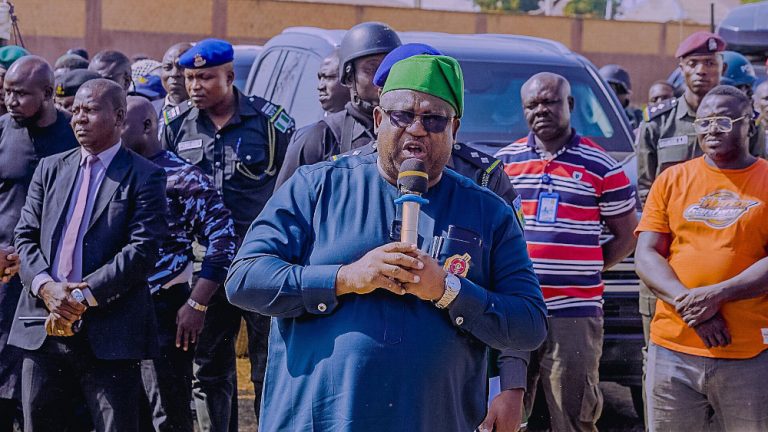Governor Caleb Mutfwang of Nigeria’s Plateau State has declared a week of mourning from January 1 to 8 to honor the deaths of at least 200 Christians killed over Christmas by Fulani Muslim herdsmen, targeting the country’s Christians. Bishop Matthew Hassan Kukah of Sokoto, Nigeria, said the attackers were “children of darkness” and came “from the deepest pit of hell.”
The massacres of December 23-28 also forced thousands of people to flee their homes.
As many as 80 villages in Plateau State were attacked, Christian humanitarian group Release International reported on December 30. Bodies continue to be discovered and attacks are expected to continue, the humanitarian group said.
“I urge all citizens to use these days for intense prayers to seek the intervention of the Almighty God in the defense of our territories against the wicked men who have risen against us,” Mutfwang said in a statement. video statement released on January 2.
The local leader requested that the Muslim prayers on Friday January 5 and the masses on Sunday January 7 be dedicated “as special days of prayer for the return of lasting peace to the Plateau (region), ” he said. he declares.
In a three-page New Year’s message, titled “Blood and Crucifixion on the Plateau,” a copy of which OSV News obtained, Kukah strongly condemned the killers as “sons of Satan.”
“These invisible men have returned to the Plateau, carrying their gifts of death and destruction,” he said, adding that the Fulani herdsmen “came from the deepest pit of hell, the habitat of the demons that ‘they are”.
Calling the killers “children of darkness,” he said they had taken “the light of Christmas joy from thousands of people on the Plateau.”
“They imagined that they would unleash an orgy of bloodshed, seduce the peace-loving ordinary people of the Plateau and entrust them to a mission of senseless assassination of their fellow citizens in the name of retaliation,” he said.
Kukah said he was appalled by the violence and killings in Nigeria’s northern states and blamed the country’s government and security agencies for failing to protect citizens.
“Over the years, these murderers have left their mark of blood and tears across the entire northern states, indiscriminately wreaking destruction on vast swathes of land and communities,” Kukah said. “In all this, the Nigerian state and its security agencies are caught off guard.”
He added that “funerals” and “coffins” have become part of “our landscape”.
He expressed the despair of Nigerians who, he said, were losing faith in their government and religious leaders.
“As we religious leaders have continued to use our moral authority to encourage our people not to take the laws into their own hands, we risk being swept away by the anger and frustration of our people,” he said. he said, adding that Nigeria’s “shots of grief” are “overflowing.”
“We have cried enough tears. We can pretend that we are not at war, but in reality, a war is being waged against the Nigerian state and its people. God forbid, but we could break down at any moment, n “anywhere and for any reason,” Kukah wrote.
Semi-nomadic Fulani herders have for years attacked Christian and Muslim Hausa farmers, claiming the farmers are appropriating pastures essential to their survival, but Christian groups reject this claim and call for protection against this radicalized group like thousands many people have done it. been killed in recent years.
Nigeria has remained at the forefront when it comes to the persecution of Christians. According to the latest Vatican statistics, four of the nine missionaries killed in Africa in 2023 were recorded in Nigeria. The killers “do not respect religious, regional or ethnic boundaries,” Kukah said.
Open Doors reported that 90% of the more than 5,600 Christians killed because of their faith last year were from Nigeria, with the total number of Christians killed in 2023 up 80% from five years ago .
The latest annual report from Aid to the Church in Need, a pontifical foundation dedicated to serving Christians around the world, notes that more than 7,600 Nigerian Christians were killed between January 2021 and June 2022.
Intersociety, Nigeria’s leading human rights group, observed the latest killings with “very deep shock, dismay and sadness”, saying the Fulani group – described as jihadist” by Intersociety – “has continued without control to massacre, kidnap and disappear thousands of defenseless people.” Nigerians.”
The group said that since the beginning of January 2023, 3,500 Christians have been killed by the extremist group.
In his statement, Kukah asked: “Who are these killers? Where do they come from ? Who sponsors them?
“Are we doomed to live with this and entrust this broken nation to our children? Should we all just get vaccinated and sedated to make all of this bearable?” he said in his New Year’s appeal.
However, he stressed that “for us Christians”, “in the cross, there is salvation”.
“May this new year begin the healing of our dear nation,” Kukah said.


